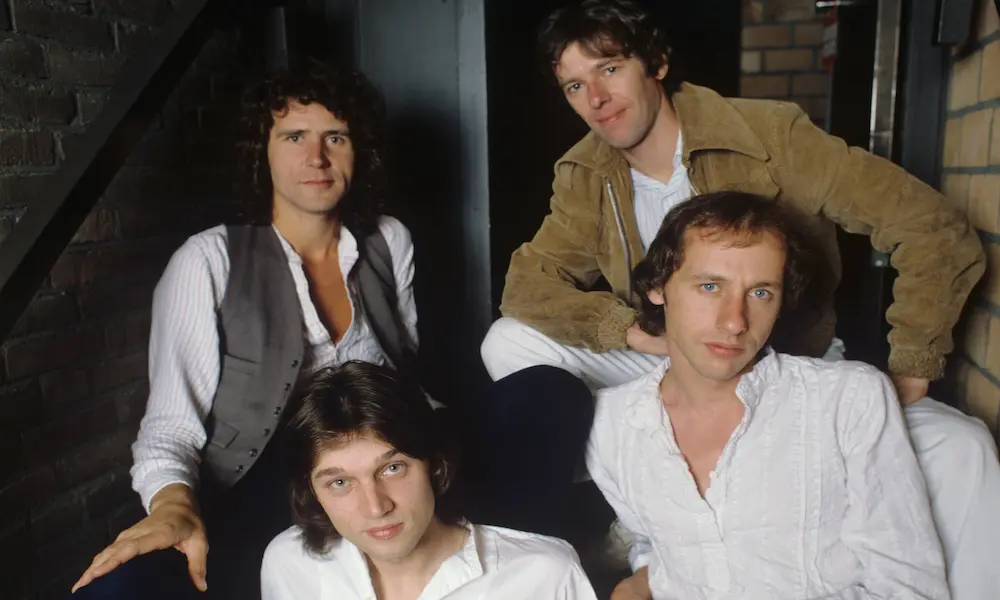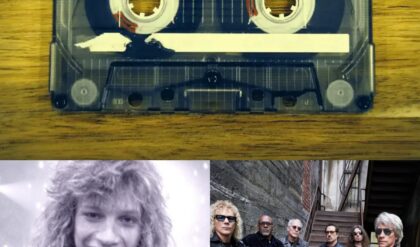80s Rock Legends: 20 Bands Gen Z Should Know
Reliving the 1980s: The Best Rock Bands That Shaped Music History

The 1980s was a defining decade for rock music, a time when bands pushed the boundaries of sound, style, and spectacle. This era was marked by the rise of MTV, which revolutionized the way music was consumed and promoted. New technology, including digital recording and synthesizers, brought fresh sounds and innovations to rock music. The explosion of creativity during this period produced some of the most memorable and influential music in rock history. Bands not only delivered unforgettable music but also crafted striking visual identities and electrifying live performances. From the anthems of Queen and U2 to the raw energy of Guns N’ Roses and the innovative sounds of Talking Heads, the 1980s gave rise to legendary bands that left an indelible mark on the genre. Here’s a nostalgic journey through the best 20 rock bands of the 1980s, each of which helped define the decade and shape the future of rock music.
1. Queen
Queen, formed in the early 1970s, achieved monumental success throughout the 80s, solidifying their status as one of the greatest rock bands of all time. The lineup, consisting of Freddie Mercury, Brian May, Roger Taylor, and John Deacon, produced a sound that was both unique and universally appealing. Their ability to blend rock with elements of opera, funk, and pop set them apart from their contemporaries.
The 80s saw Queen release some of their most iconic albums and singles. “The Game” (1980) featured hits like “Another One Bites the Dust” and “Crazy Little Thing Called Love,” which showcased their versatility and ability to craft chart-topping hits. Their music video for “Radio Ga Ga” became a staple on MTV, further elevating their global presence.

One of the defining moments of Queen’s career came in 1985 with their performance at Live Aid. Held at Wembley Stadium, this concert is often hailed as one of the greatest live performances in rock history. Freddie Mercury’s stage presence and the band’s tight musicianship captivated the audience, creating an unforgettable experience that showcased their exceptional talent and energy.
The band’s final album of the decade, “The Miracle” (1989), included hits like “I Want It All” and “Breakthru,” reaffirming their ability to evolve with the times while maintaining their signature sound. Despite facing personal challenges, including Freddie Mercury’s health issues, Queen continued to produce powerful music that resonated with fans around the world.
Queen’s impact on rock music extends beyond their 80s success. Their innovative approach to music videos, theatrical live performances, and diverse sound influenced countless artists across various genres. Queen remains a beloved and influential force in music, and their legacy continues to inspire new generations of musicians and fans alike.
2. U2
Emerging from Dublin, Ireland, U2 became one of the most influential rock bands of the 80s, known for their anthemic sound and socially conscious lyrics. Formed in 1976 by Bono (Paul Hewson), The Edge (David Howell Evans), Adam Clayton, and Larry Mullen Jr., the band’s music evolved significantly over the decade, gaining them worldwide acclaim and a dedicated fan base.
U2’s breakthrough came with their third album, “War” (1983), which featured powerful tracks like “Sunday Bloody Sunday” and “New Year’s Day.” These songs, characterized by The Edge’s innovative guitar work and Bono’s impassioned vocals, addressed political and social issues, resonating with a global audience. “War” established U2 as a band willing to tackle serious themes through their music.

The band’s 1984 album, “The Unforgettable Fire,” marked a shift towards a more atmospheric and experimental sound, produced by Brian Eno and Daniel Lanois. Hits like “Pride (In the Name of Love)” honored civil rights leader Martin Luther King Jr., further highlighting their commitment to social justice.
U2’s 1987 album “The Joshua Tree” elevated them to superstar status. Featuring iconic tracks like “With or Without You,” “I Still Haven’t Found What I’m Looking For,” and “Where the Streets Have No Name,” the album received critical acclaim and commercial success. “The Joshua Tree” topped charts around the world and won several Grammy Awards, solidifying U2’s place in rock history.
Their live performances during this era were legendary, with the band’s energy and Bono’s charismatic stage presence captivating audiences. The 1988 documentary and live album “Rattle and Hum” captured the band’s exploration of American roots music and their experiences on tour.
U2’s influence on the rock genre and their ability to address profound themes through music have cemented their legacy as one of the greatest bands of the 80s. Their innovative sound, passionate performances, and dedication to social causes continue to inspire artists and fans worldwide.
3. Bon Jovi
Hailing from New Jersey, Bon Jovi emerged as one of the most iconic rock bands of the 80s, blending hard rock with pop sensibilities to create a string of memorable hits. Fronted by charismatic lead singer Jon Bon Jovi, the band also featured guitarist Richie Sambora, keyboardist David Bryan, bassist Alec John Such, and drummer Tico Torres. Their anthemic songs and energetic performances quickly garnered them a massive following.
Bon Jovi’s breakthrough came with their third album, “Slippery When Wet” (1986), which catapulted them to international stardom. The album produced several chart-topping singles, including “Livin’ on a Prayer,” “You Give Love a Bad Name,” and “Wanted Dead or Alive.” These tracks showcased the band’s knack for writing catchy, sing-along choruses and their ability to blend rock with accessible pop elements.
“Livin’ on a Prayer,” in particular, became an anthem of the 80s, telling the story of working-class struggles and hope. Its iconic music video, featuring the band performing on stage with Jon Bon Jovi’s signature mane blowing in the wind, became a staple on MTV and solidified their image as rock superstars.
Following the success of “Slippery When Wet,” Bon Jovi released “New Jersey” (1988), which continued their streak of hits with songs like “Bad Medicine” and “I’ll Be There for You.” The album reinforced their status as one of the top rock bands of the decade, capable of delivering both rock anthems and heartfelt ballads.
Bon Jovi’s relentless touring and high-energy live performances played a significant role in their popularity. The band’s ability to connect with their audience through powerful stage presence and relatable lyrics endeared them to fans around the world.
Beyond their music, Bon Jovi’s style and image influenced 80s fashion, with Jon Bon Jovi’s leather jackets, ripped jeans, and big hair epitomizing the era’s rock aesthetic. Their impact on the music industry was profound, paving the way for future rock and pop acts.
Bon Jovi’s blend of rock and pop, coupled with their dynamic performances and enduring hits, secured their place as one of the defining bands of the 80s. Their music continues to resonate with fans old and new, proving the lasting appeal of their anthems and the timeless quality of their sound.
4. Guns N’ Roses
Bursting onto the scene in the late 80s, Guns N’ Roses brought a raw, edgy energy to rock that shook up the music world. Formed in 1985 in Los Angeles, the band’s classic lineup consisted of Axl Rose (vocals), Slash (lead guitar), Izzy Stradlin (rhythm guitar), Duff McKagan (bass), and Steven Adler (drums). Their debut album, “Appetite for Destruction” (1987), is one of the best-selling debut albums of all time and a quintessential rock masterpiece.
“Appetite for Destruction” produced several iconic tracks that became anthems of the era. “Sweet Child o’ Mine,” with its unforgettable opening riff and heartfelt lyrics, topped the Billboard Hot 100 chart. “Welcome to the Jungle” showcased Axl Rose’s powerful voice and the band’s gritty sound, while “Paradise City” became a stadium anthem with its catchy chorus and dynamic instrumentation. The album’s raw intensity and rebellious spirit resonated with a generation of rock fans.

Guns N’ Roses’ live performances were legendary for their intensity and unpredictability. Axl Rose’s volatile stage presence and Slash’s virtuosic guitar solos made each concert an unforgettable experience. Despite internal conflicts and lineup changes, the band’s impact on rock music remained undeniable.
In 1988, the band released “G N’ R Lies,” which included the hit single “Patience,” showcasing a softer, acoustic side of the band. Their follow-up albums, “Use Your Illusion I” and “Use Your Illusion II” (both released in 1991), further solidified their status as rock legends. These albums featured tracks like “November Rain,” “Don’t Cry,” and “Civil War,” which highlighted the band’s musical versatility and lyrical depth.
Guns N’ Roses’ influence on rock music extends far beyond their 80s origins. Their blend of hard rock, punk, and glam elements created a unique sound that has inspired countless bands. The group’s ability to blend aggression with melody and their unapologetic attitude made them icons of the rock world. Despite the ups and downs in their career, Guns N’ Roses’ legacy as one of the greatest rock bands of the 80s is firmly established.
5. Metallica
Pioneers of thrash metal, Metallica’s aggressive sound and complex compositions defined the heavy metal scene of the 80s. Formed in 1981 in Los Angeles by drummer Lars Ulrich and guitarist/vocalist James Hetfield, the band’s classic lineup also included lead guitarist Kirk Hammett and bassist Cliff Burton (later replaced by Jason Newsted). Metallica’s music combined speed, technical prowess, and intricate songwriting, setting them apart from other metal bands.

Metallica’s third album, “Master of Puppets” (1986), is widely regarded as one of the greatest heavy metal albums of all time. The album’s title track, with its powerful riffs and socially conscious lyrics, became an anthem for metal fans. Other standout tracks like “Battery” and “Welcome Home (Sanitarium)” showcased the band’s ability to blend aggression with melody and narrative depth.
Tragedy struck in 1986 when bassist Cliff Burton died in a bus accident while the band was touring in Sweden. Despite this loss, Metallica continued to forge ahead, releasing “…And Justice for All” (1988). The album featured complex arrangements and politically charged lyrics, with tracks like “One,” which became one of their most iconic songs. The accompanying music video for “One” received heavy rotation on MTV, further boosting the band’s popularity.
Metallica’s influence on the metal genre is profound. Their ability to combine technical skill with emotional depth set a new standard for heavy metal music. The band’s relentless touring and high-energy performances helped them build a loyal fanbase that spans generations.
In 1991, Metallica released their self-titled album, also known as “The Black Album,” which marked a shift towards a more mainstream sound. Hits like “Enter Sandman” and “The Unforgiven” brought them unprecedented commercial success, solidifying their place as one of the biggest rock bands in the world.
Metallica’s legacy is one of innovation and resilience. They pushed the boundaries of metal music and inspired countless bands with their technical prowess and uncompromising approach. Their influence on the genre is undeniable, making them one of the most important rock bands of the 80s and beyond.
6. The Police
Led by Sting (Gordon Sumner), The Police were a trio that blended rock, reggae, and punk to create a distinctive sound that dominated the early 80s. The band, which also included Andy Summers on guitar and Stewart Copeland on drums, formed in London in 1977 and quickly rose to fame with their unique musical style and Sting’s compelling vocals.
Their 1980 album “Zenyatta Mondatta” produced hits like “Don’t Stand So Close to Me” and “De Do Do Do, De Da Da Da,” showcasing their knack for catchy melodies and socially relevant lyrics. The album’s fusion of reggae rhythms with rock dynamics set them apart from other bands of the era and solidified their place in the rock pantheon.
The Police’s 1981 album, “Ghost in the Machine,” saw the band experimenting with more complex arrangements and electronic elements. Hits like “Every Little Thing She Does Is Magic” and “Spirits in the Material World” demonstrated their musical evolution and ability to tackle diverse themes. The band’s sophisticated sound and Sting’s introspective lyrics resonated with a wide audience, earning them critical and commercial success.
Their final studio album, “Synchronicity” (1983), is often considered their masterpiece. The album included the global hit “Every Breath You Take,” which became one of the most played songs in radio history. Other standout tracks like “King of Pain” and “Wrapped Around Your Finger” showcased the band’s ability to blend complex musical structures with accessible melodies.
The Police’s innovative approach to rock music and their ability to blend different genres made them one of the most influential bands of the 80s. Their sophisticated sound and Sting’s distinctive voice set a new standard for rock music, influencing countless artists across various genres. Despite their relatively short career, The Police’s impact on the music world is lasting and profound.
The band disbanded in 1986, with Sting pursuing a successful solo career. However, their music continues to be celebrated for its innovation and timeless quality. The Police’s legacy as one of the most important rock bands of the 80s is firmly established, and their influence on modern music remains significant.
7. Def Leppard
Def Leppard emerged as one of the most successful rock bands of the 80s, blending hard rock with polished pop sensibilities to create a sound that resonated with a wide audience. Formed in Sheffield, England, in 1977, the band’s lineup included Joe Elliott (vocals), Rick Savage (bass), Rick Allen (drums), and guitarists Steve Clark and Phil Collen. Their high-energy performances and catchy hooks quickly earned them a loyal fanbase.

The release of “Pyromania” in 1983 marked Def Leppard’s breakthrough into mainstream success. Produced by Mutt Lange, the album featured hits like “Photograph,” “Rock of Ages,” and “Foolin’,” which showcased the band’s ability to craft memorable anthems. “Pyromania” sold over ten million copies in the United States alone, cementing Def Leppard’s status as rock superstars.
Def Leppard faced a significant challenge in 1984 when drummer Rick Allen lost his arm in a car accident. Remarkably, Allen adapted to a custom-designed drum kit and continued to perform with the band. This resilience was a testament to their determination and unity.
Their 1987 album “Hysteria” became one of the defining records of the decade. Also produced by Mutt Lange, “Hysteria” featured a string of hit singles, including “Pour Some Sugar on Me,” “Love Bites,” and “Armageddon It.” The album’s polished production, intricate harmonies, and infectious hooks propelled it to massive commercial success, selling over 20 million copies worldwide.
Def Leppard’s influence extended beyond their music. They played a significant role in popularizing the visual style of glam metal, with their flamboyant fashion and energetic stage presence. Their music videos became staples on MTV, further solidifying their place in rock history.
The band’s ability to blend hard rock with pop appeal, coupled with their perseverance through personal challenges, has left a lasting legacy. Def Leppard continues to tour and release music, maintaining their status as one of the most beloved rock bands of the 80s.
8. AC/DC
AC/DC’s high-voltage rock and roll continued to electrify the 80s, solidifying their legacy as one of the greatest rock bands of all time. Formed in 1973 by brothers Angus and Malcolm Young, the Australian band’s lineup included lead vocalist Bon Scott until his tragic death in 1980. Brian Johnson then took over as the lead singer, and the band experienced one of their most successful periods.
AC/DC’s 1980 album “Back in Black” is a landmark in rock history. It was the first album with Brian Johnson and became a massive commercial success, featuring iconic tracks like “You Shook Me All Night Long,” “Hells Bells,” and the title track “Back in Black.” The album’s raw energy, memorable riffs, and anthemic choruses resonated with fans worldwide, and it has sold over 50 million copies, making it one of the best-selling albums of all time.
Following “Back in Black,” AC/DC continued their success with albums like “For Those About to Rock (We Salute You)” (1981), which included the title track that became a staple of their live performances. The band’s straightforward, no-frills rock and roll appealed to a broad audience, and their relentless touring helped solidify their reputation as one of the best live acts in rock.
The band’s sound is characterized by Angus Young’s explosive guitar work and Brian Johnson’s powerful vocals. Their live shows are known for their high energy and theatrical elements, including Angus Young’s schoolboy uniform and frenetic stage antics.
AC/DC’s influence on rock music is profound. They inspired countless bands with their hard-hitting sound and rebellious attitude. Despite changes in the music industry, AC/DC has maintained a consistent style, sticking to their roots while continuing to draw huge crowds.
Their enduring popularity and impact on the genre make AC/DC one of the most significant rock bands of the 80s. Their music continues to be celebrated by fans of all ages, and their legacy as rock legends is secure.
9. Journey
Journey, known for their powerful ballads and arena rock anthems, defined the 80s rock sound with their polished production and emotive performances. Formed in San Francisco in 1973, the band’s classic lineup included Steve Perry (vocals), Neal Schon (guitar), Jonathan Cain (keyboards), Ross Valory (bass), and Steve Smith (drums).
The release of their album “Escape” in 1981 marked Journey’s rise to the top of the rock charts. The album featured some of their biggest hits, including “Don’t Stop Believin’,” “Who’s Crying Now,” and “Open Arms.” “Don’t Stop Believin’” became an anthem of resilience and hope, and it remains one of the best-selling digital tracks of all time. Steve Perry’s soaring vocals and Neal Schon’s melodic guitar work defined the band’s sound and helped “Escape” achieve multi-platinum status.

Journey’s follow-up album, “Frontiers” (1983), continued their success with hits like “Separate Ways (Worlds Apart)” and “Faithfully.” These songs showcased the band’s ability to blend rock with heartfelt lyrics and powerful melodies, solidifying their reputation as masters of the power ballad.
The band’s live performances were characterized by Steve Perry’s dynamic stage presence and the band’s tight musicianship. Journey’s ability to connect with audiences through their emotive songs and energetic shows made them one of the most popular touring acts of the decade.
Beyond their music, Journey’s visual style and music videos played a significant role in their popularity. Their videos received heavy rotation on MTV, further boosting their profile and reaching a wider audience.
Journey’s influence extends beyond the 80s. Their music continues to resonate with new generations, and “Don’t Stop Believin’” has become a cultural touchstone, frequently featured in films, TV shows, and sports events. The band’s ability to craft timeless songs with universal appeal ensures their legacy as one of the greatest rock bands of the 80s.
Journey’s impact on rock music and their ability to create enduring hits make them a quintessential part of 80s rock history. Their music remains a testament to the power of emotive, well-crafted rock, and their legacy continues to inspire and entertain fans around the world.
10. Van Halen
Van Halen, known for their revolutionary guitar techniques and energetic performances, dominated the rock scene in the 80s. Formed in Pasadena, California, in 1972, the band consisted of Eddie Van Halen (guitar), David Lee Roth (vocals), Michael Anthony (bass), and Alex Van Halen (drums). Eddie Van Halen’s innovative guitar work, characterized by his use of tapping and rapid arpeggios, set a new standard for rock musicianship.

The band’s 1984 album “1984” marked a high point in their career. The album featured hits like “Jump,” which became their first and only song to reach number one on the Billboard Hot 100. With its catchy synthesizer riff and anthemic chorus, “Jump” showcased the band’s versatility and ability to incorporate new elements into their sound. Other tracks like “Panama” and “Hot for Teacher” became rock radio staples, highlighting David Lee Roth’s flamboyant vocals and Eddie Van Halen’s virtuosity.
Van Halen’s live performances were legendary for their high energy and theatricality. David Lee Roth’s acrobatics and Eddie Van Halen’s guitar solos captivated audiences, making their concerts unforgettable experiences. The band’s ability to combine technical skill with showmanship set them apart from their peers.
In 1985, David Lee Roth left the band and was replaced by Sammy Hagar. The change in lineup led to a different sound and continued success, with albums like “5150” (1986) and “OU812” (1988) producing hits such as “Why Can’t This Be Love” and “When It’s Love.” The band’s ability to adapt to new dynamics while maintaining their core sound ensured their continued popularity.
Van Halen’s influence on rock music is immense. Eddie Van Halen’s guitar innovations inspired countless musicians, and the band’s blend of hard rock, pop, and technical prowess set a high bar for rock bands in the 80s and beyond. Their legacy as one of the most iconic rock bands of the 80s is well-deserved, and their music continues to be celebrated by fans around the world.
11. R.E.M.
Emerging from the college rock scene, R.E.M. combined jangly guitars, introspective lyrics, and a DIY ethos to create a unique sound that resonated with a broad audience. Formed in Athens, Georgia, in 1980, the band consisted of Michael Stipe (vocals), Peter Buck (guitar), Mike Mills (bass), and Bill Berry (drums). Their music played a crucial role in the development of alternative rock.
R.E.M.’s debut album, “Murmur” (1983), was critically acclaimed for its enigmatic lyrics and distinctive sound. Tracks like “Radio Free Europe” and “Talk About the Passion” showcased the band’s ability to craft compelling songs with a mix of folk, rock, and post-punk elements. The album’s success established R.E.M. as pioneers of the alternative rock movement.
Their follow-up albums, “Reckoning” (1984) and “Fables of the Reconstruction” (1985), continued to build their reputation. However, it was their 1987 album “Document” that propelled them to mainstream success. The album included hits like “The One I Love” and “It’s the End of the World as We Know It (And I Feel Fine),” which received significant radio play and showcased their growing confidence as songwriters.
R.E.M.’s 1988 album “Green” marked their major label debut and featured hits like “Stand” and “Orange Crush.” The band’s ability to address social and political issues through their music resonated with a generation of listeners who were looking for substance in their rock music.
The band’s live performances were known for Michael Stipe’s charismatic stage presence and the band’s tight musicianship. Their ability to connect with audiences through their emotionally charged performances made them one of the most compelling live acts of the decade.
R.E.M.’s influence on alternative rock is profound. They paved the way for countless bands and helped bring alternative music into the mainstream. Their legacy as one of the most important bands of the 80s is cemented by their ability to innovate and remain relevant over the years. R.E.M.’s music continues to inspire new generations of musicians and fans, ensuring their place in rock history.
12. Mötley Crüe
Mötley Crüe personified the excess and glamour of the 80s glam metal scene with their wild lifestyles, heavy sound, and outrageous performances. Formed in Los Angeles in 1981, the band consisted of Vince Neil (vocals), Nikki Sixx (bass), Mick Mars (guitar), and Tommy Lee (drums). Their music, characterized by catchy hooks and raw energy, quickly earned them a dedicated fanbase.
The band’s 1983 album “Shout at the Devil” catapulted them to fame. The album included hits like “Looks That Kill” and the title track “Shout at the Devil,” which showcased their aggressive sound and rebellious attitude. The album’s dark imagery and heavy riffs resonated with fans and established Mötley Crüe as one of the leading bands in the glam metal genre.

Their 1985 album “Theatre of Pain” featured the power ballad “Home Sweet Home,” which became one of their signature songs. The album demonstrated the band’s ability to blend hard rock with melodic elements, broadening their appeal. “Home Sweet Home” became an anthem of the 80s, often cited as one of the first power ballads to gain mainstream popularity.
Mötley Crüe’s 1987 album “Girls, Girls, Girls” continued their success with hits like the title track and “Wild Side.” The album’s raw energy and themes of decadence and rebellion encapsulated the spirit of the glam metal scene.
Their 1989 album “Dr. Feelgood” was a commercial triumph, featuring hits like “Kickstart My Heart” and the title track “Dr. Feelgood.” The album’s polished production and hard-hitting sound solidified their status as rock superstars. “Dr. Feelgood” became their first album to reach number one on the Billboard 200, cementing their place in rock history.
Mötley Crüe’s live performances were legendary for their theatrics and energy. From Tommy Lee’s rotating drum kit to their pyrotechnic displays, the band’s concerts were spectacles that captivated audiences.
Beyond their music, Mötley Crüe’s lifestyle epitomized the excesses of the rock and roll lifestyle. Their tales of debauchery and excess became part of their legend, further enhancing their image as rock rebels.
Mötley Crüe’s influence on the glam metal genre is significant. They helped define the sound and style of the 80s rock scene, inspiring countless bands to embrace a similar aesthetic. Their music continues to be celebrated by fans, and their legacy as one of the most iconic rock bands of the 80s is secure.
13. Aerosmith
Aerosmith, often dubbed “America’s Greatest Rock and Roll Band,” experienced a major resurgence in the 80s that solidified their legacy in rock history. Formed in 1970 in Boston, Massachusetts, the band’s classic lineup features Steven Tyler (vocals), Joe Perry (guitar), Brad Whitford (guitar), Tom Hamilton (bass), and Joey Kramer (drums). Aerosmith’s blend of blues rock and hard rock, combined with Tyler’s dynamic stage presence and Perry’s guitar prowess, made them a force to be reckoned with.

The band’s comeback began in the mid-80s after overcoming various personal and professional challenges, including battles with addiction. Their 1985 album “Done with Mirrors” marked the return of Joe Perry and Brad Whitford, but it was their collaboration with hip-hop group Run-D.M.C. on the remake of “Walk This Way” in 1986 that truly reignited their career. This groundbreaking fusion of rock and rap not only revitalized Aerosmith’s image but also introduced them to a new generation of fans.
Aerosmith’s 1987 album “Permanent Vacation” was a massive commercial success, featuring hits like “Dude (Looks Like a Lady),” “Rag Doll,” and “Angel.” The album showcased the band’s ability to blend their classic rock sound with the polished production techniques of the 80s, appealing to both old and new fans alike.
Their 1989 follow-up, “Pump,” continued their streak of success with hits like “Love in an Elevator,” “Janie’s Got a Gun,” and “What It Takes.” “Pump” was praised for its energetic sound and mature themes, earning Aerosmith critical acclaim and solidifying their status as rock icons.
Aerosmith’s live performances in the 80s were legendary for their energy and showmanship. Steven Tyler’s flamboyant stage presence and Joe Perry’s fiery guitar solos captivated audiences worldwide, making their concerts must-see events.
Beyond their music, Aerosmith’s influence extended to pop culture, with their style and music videos becoming iconic symbols of the era. Their ability to adapt and evolve while staying true to their roots has ensured their lasting legacy in rock history.
Aerosmith’s resurgence in the 80s is a testament to their resilience and enduring appeal. Their ability to overcome adversity and continue producing hit after hit solidified their place as one of the greatest rock bands of all time. Their music from the 80s remains a significant part of their legacy, continuing to inspire and entertain fans around the world.
14. INXS
Australian band INXS, fronted by charismatic lead singer Michael Hutchence, brought a unique blend of rock, new wave, and dance music to the 80s. Formed in 1977, the band’s lineup included the Farriss brothers—Tim (guitar), Andrew (keyboards), and Jon (drums)—along with Garry Gary Beers (bass) and Kirk Pengilly (guitar and saxophone). INXS’s innovative sound and dynamic live performances made them one of the standout acts of the decade.
The release of their album “Kick” in 1987 marked the peak of their commercial success. “Kick” produced a string of hit singles that dominated the charts and showcased the band’s versatility. “Need You Tonight,” with its seductive groove and Hutchence’s sultry vocals, became their first number one hit in the U.S. Other tracks like “Devil Inside,” “New Sensation,” and “Never Tear Us Apart” further cemented INXS’s place in rock history.
INXS’s ability to blend rock with danceable rhythms and catchy melodies set them apart from their contemporaries. Their music videos, which received heavy rotation on MTV, highlighted the band’s stylish image and Michael Hutchence’s magnetic stage presence.
Their previous albums, “Listen Like Thieves” (1985) and “Shabooh Shoobah” (1982), also contributed to their rise, featuring hits like “What You Need” and “Don’t Change,” which helped establish their signature sound.
INXS’s live performances were electrifying, with Michael Hutchence’s charismatic frontmanship and the band’s tight musicianship creating unforgettable concert experiences. Their ability to connect with audiences through energetic shows and memorable songs made them a global phenomenon.
Beyond their music, INXS’s influence extended to fashion and pop culture. Their sleek, stylish image and Hutchence’s rock star persona left a lasting impression on fans and fellow musicians alike.
The tragic death of Michael Hutchence in 1997 marked a significant loss for the band and their fans. However, INXS’s legacy continues to thrive through their music, which remains as vibrant and influential as ever. Their innovative approach to rock and their ability to blend genres have ensured their lasting impact on the music world.
15. Dire Straits
With Mark Knopfler’s distinctive guitar playing and storytelling lyrics, Dire Straits achieved massive success in the 80s, becoming one of the most influential rock bands of the decade. Formed in 1977 in London, the band’s lineup during their peak included Mark Knopfler (vocals and guitar), John Illsley (bass), Alan Clark (keyboards), and Guy Fletcher (keyboards). Their music, characterized by its clean, precise sound and Knopfler’s laid-back vocal style, appealed to a broad audience.

Dire Straits’ 1985 album “Brothers in Arms” was a landmark release that catapulted them to international stardom. The album featured the hit single “Money for Nothing,” which became famous for its iconic guitar riff and the satirical look at the music industry. The accompanying music video, which featured early computer animation, became one of the most memorable videos of the MTV era.
Other tracks from “Brothers in Arms,” such as “Walk of Life” and the title track “Brothers in Arms,” showcased the band’s versatility and ability to blend rock with elements of jazz and blues. The album was one of the first to be fully digitally recorded and became one of the best-selling albums of all time, winning multiple Grammy Awards and selling over 30 million copies worldwide.
Earlier in the decade, Dire Straits released successful albums like “Making Movies” (1980) and “Love Over Gold” (1982). “Making Movies” included hits like “Romeo and Juliet” and “Tunnel of Love,” which highlighted Knopfler’s narrative songwriting and the band’s rich, layered sound. “Love Over Gold” featured the epic track “Telegraph Road,” known for its complex structure and lyrical depth.
Dire Straits’ live performances were renowned for their musicianship and Mark Knopfler’s masterful guitar work. The band’s ability to replicate their intricate studio sound on stage made their concerts highly anticipated events.
Beyond their music, Dire Straits influenced the production techniques and sound of 80s rock. Their use of digital recording technology and emphasis on high-quality sound set new standards in the industry.
The band’s ability to blend sophisticated lyrics with accessible melodies ensured their music’s broad appeal. Dire Straits’ legacy as one of the most influential bands of the 80s is cemented by their innovative approach to rock music and their ability to connect with listeners on a deep, emotional level. Their music continues to be celebrated for its artistry and timeless quality.
16. Talking Heads
Talking Heads, led by the enigmatic David Byrne, were pioneers of the new wave and art rock movements in the 1980s. Formed in 1975 in New York City, the band also included Chris Frantz (drums), Tina Weymouth (bass), and Jerry Harrison (keyboards and guitar). Known for their innovative fusion of punk, funk, world music, and avant-garde art, Talking Heads carved out a unique space in the music world that influenced countless artists.

Their 1980 album “Remain in Light” is often considered their magnum opus. Produced by Brian Eno, the album featured complex polyrhythms, African-inspired beats, and layered textures that were groundbreaking at the time. The hit single “Once in a Lifetime” became an anthem, with its memorable bass line and existential lyrics. The accompanying music video, featuring David Byrne’s jerky dance moves and striking visuals, became iconic and received heavy rotation on MTV.
Talking Heads’ ability to blend disparate musical styles set them apart. Their earlier albums, “More Songs About Buildings and Food” (1978) and “Fear of Music” (1979), showcased their willingness to experiment with sound and form. Songs like “Psycho Killer,” “Life During Wartime,” and “Take Me to the River” displayed their knack for combining catchy melodies with thought-provoking lyrics.
The band’s 1983 album “Speaking in Tongues” brought them mainstream success with the hit single “Burning Down the House.” The album’s blend of danceable rhythms and quirky lyrics appealed to a broad audience, further establishing Talking Heads as innovators in the music scene.
Talking Heads’ live performances were legendary for their theatricality and energy. The 1984 concert film “Stop Making Sense,” directed by Jonathan Demme, is widely regarded as one of the greatest concert films ever made. The film captured the band’s dynamic stage presence and Byrne’s eccentric charisma, creating an immersive experience for viewers.
Talking Heads’ influence extends beyond their music. Their artistic approach to performance and visual media helped redefine what a rock band could be, inspiring future generations of musicians and artists. The band disbanded in 1991, but their legacy continues to thrive. Talking Heads remain a touchstone for innovation in music and art, celebrated for their ability to push boundaries and explore new creative territories.
17. Bruce Springsteen & The E Street Band
Bruce Springsteen, often referred to as “The Boss,” and his legendary backing group, The E Street Band, captured the essence of American rock and the working-class spirit in the 1980s. Formed in the early 1970s, the band includes key members like Clarence Clemons (saxophone), Steven Van Zandt (guitar), Max Weinberg (drums), Roy Bittan (keyboards), and Garry Tallent (bass). Springsteen’s evocative storytelling and the band’s powerful, soulful sound created some of the most enduring music of the decade.

Springsteen’s 1980 album “The River” was a commercial success, featuring hits like “Hungry Heart” and the title track “The River.” The double album showcased his ability to blend rock with poignant, blue-collar narratives, resonating deeply with a wide audience. Songs on the album reflected themes of love, hardship, and resilience, capturing the complexities of everyday life.
However, it was his 1984 album “Born in the U.S.A.” that catapulted Bruce Springsteen to global superstardom. The album produced seven top-ten singles, including “Dancing in the Dark,” “Glory Days,” and the iconic title track “Born in the U.S.A.” The latter became an anthem, often misunderstood as a patriotic song despite its critical commentary on the treatment of Vietnam veterans. The album’s blend of upbeat rock anthems and introspective ballads showcased Springsteen’s versatility and depth as a songwriter.
Springsteen’s live performances in the 80s were legendary for their energy and length, often lasting over three hours. His rapport with the audience and the E Street Band’s exceptional musicianship made each concert a communal, almost religious experience. The band’s dynamic stage presence and the emotional intensity of their performances left a lasting impact on fans worldwide.
Beyond his music, Springsteen’s influence extended to social and political spheres. His songs often addressed social issues, and he became a voice for the working class. Springsteen’s ability to articulate the struggles and dreams of ordinary people earned him widespread respect and admiration.
Bruce Springsteen & The E Street Band’s legacy in the 80s is marked by their ability to create music that was both deeply personal and universally relatable. Their impact on rock music and American culture is profound, with Springsteen’s storytelling and the band’s powerful sound continuing to inspire new generations of musicians and fans.
18. ZZ Top
With their blend of blues rock, boogie, and Southern rock, ZZ Top became one of the most distinctive and enduring bands of the 1980s. Formed in Houston, Texas, in 1969, the band’s classic lineup includes Billy Gibbons (vocals and guitar), Dusty Hill (bass and vocals), and Frank Beard (drums). Known for their signature beards, sunglasses, and humorous music videos, ZZ Top created a unique image that complemented their gritty, bluesy sound.

The release of their 1983 album “Eliminator” marked a major turning point in their career. The album, which incorporated synthesizers and more polished production, produced several hit singles that became staples of 80s rock. “Gimme All Your Lovin’,” “Sharp Dressed Man,” and “Legs” showcased the band’s ability to blend their blues roots with a modern, radio-friendly sound. The music videos for these songs, characterized by their humor and stylish imagery, became iconic on MTV, further boosting the band’s popularity.
ZZ Top’s follow-up album, “Afterburner” (1985), continued their success with hits like “Sleeping Bag” and “Stages.” The band’s ability to evolve their sound while maintaining their blues-rock foundation appealed to a broad audience, solidifying their status as rock legends.
The band’s live performances were known for their high energy and showmanship. Billy Gibbons and Dusty Hill’s synchronized stage moves and Frank Beard’s solid drumming created a compelling visual and auditory experience for concertgoers. ZZ Top’s blend of musicianship and theatrics made their concerts memorable events.
ZZ Top’s influence extends beyond their music. Their distinctive image and humorous approach to rock set them apart from their peers, and their incorporation of new technology into their sound influenced many other artists. The band’s ability to stay relevant through decades of changing musical trends is a testament to their talent and adaptability.
ZZ Top’s legacy as one of the most enduring rock bands of the 80s is secure. Their music continues to be celebrated for its infectious energy and timeless appeal. ZZ Top’s blend of blues, rock, and boogie remains a defining sound of the 80s, and their influence can be heard in the work of countless musicians who followed in their footsteps.
19. The Cure
The Cure, pioneers of gothic rock and post-punk, emerged as one of the most influential bands of the 80s with their melancholic yet catchy sound. Formed in Crawley, England, in 1978, the band’s lineup has seen numerous changes, but its core member, Robert Smith (vocals, guitar), has remained the constant driving force behind their music and distinctive image. Known for his distinctive voice, dark eyeliner, and wild hair, Smith became an icon of alternative rock.

The band’s early work, characterized by sparse arrangements and a stark, post-punk sound, evolved significantly over the decade. Their 1980 album “Seventeen Seconds” introduced the world to their haunting soundscapes with tracks like “A Forest,” which became one of their signature songs. This album, along with “Faith” (1981) and “Pornography” (1982), solidified their status in the gothic rock genre.
The Cure’s breakthrough into mainstream success came with the release of “The Head on the Door” (1985), which showcased a more accessible sound while retaining their distinctive style. The album included hits like “In Between Days” and “Close to Me,” which featured catchy melodies and introspective lyrics. These songs expanded their fanbase and received heavy rotation on radio and MTV.
Their 1987 album “Kiss Me, Kiss Me, Kiss Me” further demonstrated the band’s versatility, with a mix of upbeat tracks and brooding ballads. The hit single “Just Like Heaven” became one of their most popular songs, praised for its dreamy, romantic lyrics and infectious melody.
The Cure’s 1989 album “Disintegration” is often regarded as their masterpiece. The album’s lush production and emotional depth resonated deeply with listeners. Tracks like “Lovesong,” “Pictures of You,” and “Lullaby” showcased Robert Smith’s ability to convey complex emotions through his music. “Disintegration” received critical acclaim and commercial success, solidifying The Cure’s legacy as one of the greatest bands of the 80s.
The Cure’s live performances were known for their intensity and atmospheric quality. Robert Smith’s emotive delivery and the band’s ability to create immersive soundscapes made their concerts memorable experiences for fans.
Beyond their music, The Cure’s influence extended to fashion and pop culture, with their gothic aesthetic inspiring countless fans and future musicians. The band’s ability to blend dark themes with accessible melodies has ensured their lasting appeal.
The Cure’s legacy as pioneers of gothic rock and post-punk is well established. Their music continues to inspire new generations of artists, and their influence on the alternative rock scene remains profound. The Cure’s ability to evolve while staying true to their unique sound has secured their place in rock history.
20. Bon Jovi
While already mentioned earlier in the list, Bon Jovi’s ubiquitous presence in 80s rock cannot be overstated. They epitomized the sound and spirit of the decade with their blend of hard rock and pop sensibilities, creating anthems that defined a generation. Formed in 1983 in Sayreville, New Jersey, the band’s lineup included Jon Bon Jovi (vocals), Richie Sambora (guitar), David Bryan (keyboards), Alec John Such (bass), and Tico Torres (drums).
Bon Jovi’s breakthrough came with their third album, “Slippery When Wet” (1986), which catapulted them to international stardom. The album produced several chart-topping singles, including “Livin’ on a Prayer,” “You Give Love a Bad Name,” and “Wanted Dead or Alive.” These tracks showcased the band’s knack for writing catchy, sing-along choruses and their ability to blend rock with accessible pop elements.
“Livin’ on a Prayer,” in particular, became an anthem of the 80s, telling the story of working-class struggles and hope. Its iconic music video, featuring the band performing on stage with Jon Bon Jovi’s signature mane blowing in the wind, became a staple on MTV and solidified their image as rock superstars.
Following the success of “Slippery When Wet,” Bon Jovi released “New Jersey” (1988), which continued their streak of hits with songs like “Bad Medicine” and “I’ll Be There for You.” The album reinforced their status as one of the top rock bands of the decade, capable of delivering both rock anthems and heartfelt ballads.
Bon Jovi’s relentless touring and high-energy live performances played a significant role in their popularity. The band’s ability to connect with their audience through powerful stage presence and relatable lyrics endeared them to fans around the world.
Beyond their music, Bon Jovi’s style and image influenced 80s fashion, with Jon Bon Jovi’s leather jackets, ripped jeans, and big hair epitomizing the era’s rock aesthetic. Their impact on the music industry was profound, paving the way for future rock and pop acts.
Bon Jovi’s blend of rock and pop, coupled with their dynamic performances and enduring hits, secured their place as one of the defining bands of the 80s. Their music continues to resonate with fans old and new, proving the lasting appeal of their anthems and the timeless quality of their sound.
Bon Jovi’s influence extends to the present day, with the band continuing to tour and release new music. Their ability to adapt to changing musical landscapes while maintaining their core identity has ensured their continued success. Bon Jovi’s legacy as one of the greatest rock bands of the 80s is cemented by their enduring popularity and their impact on the rock genre.
The 1980s was a decade of diverse and dynamic rock music, with bands pushing creative boundaries and leaving lasting legacies. These 20 bands not only defined the sound of the era but also influenced future generations of musicians, ensuring their place in rock history.






